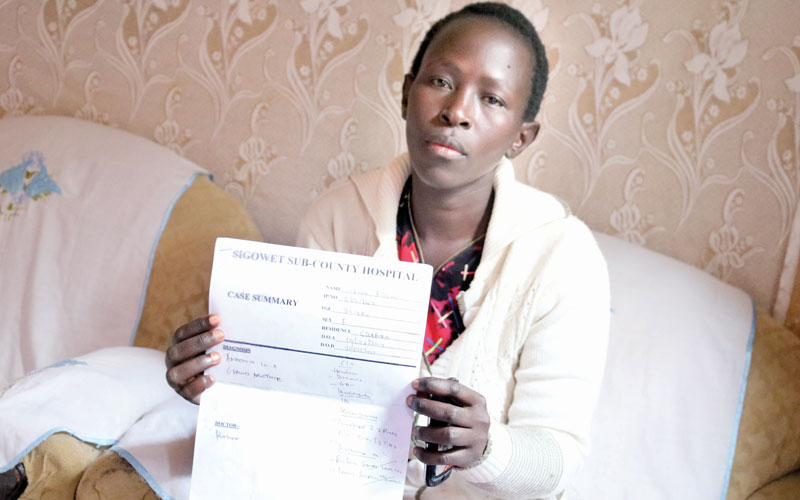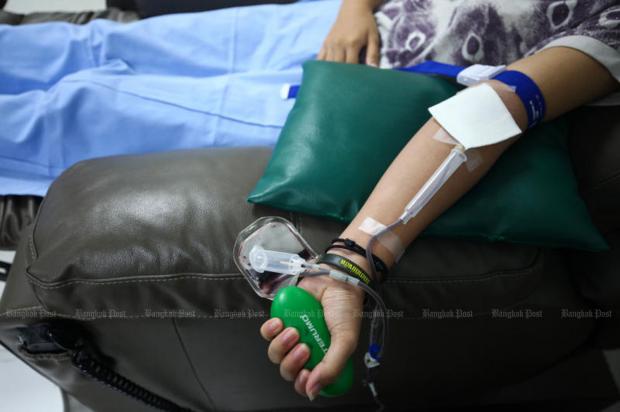
When Lilian Atieno, 31, was rushed to Sigowet Sub-county Hospital on February 19 this year for a medical check-up, little did she know that the blood transfusion she was about to receive would change her life.
It is while at the hospital, that the woman who was heavily expectant for her fourth child was examined and doctors determined she was anemic and her pregnancy was at risk.
“I was told my Hemoglobin level was too low and I needed an urgent blood transfusion,” recalls Lilian.
According to documents in her possession, the woman received the blood at the facility on the same day.

Two months later, when she gave birth at Rachuonyo Level Four Hospital, she had no fear when nurses suggested a routine HIV test.
“I had been tested three times throughout my pregnancy and ante-natal visits and I was confident that it would turn out negative as well,” she says, a position that Dinah Okeyo, an ante-natal care nurse at Atela Health Centre, confirmed.
However, results turned out to be shocking after it came out she was positive.
“I just watched the two red lines on the testing strip in shock, I thought I was dreaming,” she explained.
“The doctors told me the likely way I could have been infected was through the blood transfusion I had gotten the previous week and they even contacted Sigowet Hospital to question what could have transpired,” she added
It is there that Atieno was advised to file a case against the hospital for a botched blood transfusion, which she did at Sondu Police Station.

Together with her husband, Elisha Opiyo, Atieno went back to Sigowet Hospital to seek an explanation but the lead doctor, only identified as Lang’at, dismissed them saying “the incident was an accident and asked us not to make a big deal out of it”.
They were told the blood was requisitioned from a blood bank in Nakuru County and that the hospital would file a complaint with the facility.
The hospital’s laboratory manager Joseph Cheruiyot confirmed Atieno had sought medical services at the facility and was indeed diagnosed with low blood level and given a blood transfusion.
According to the manager, the hospital only receives properly screened blood from the KNBTS satellite centre at Kericho County Referral Hospital.
He, however, said they don’t do another blood pre-screen but only check the blood group for compatibility reasons.
“We don’t do any screening of blood here but we transfuse the same,” stated Cheruiyot, adding that the Kericho blood bank gets blood from Nakuru where screening of the same is done.

He maintained that it was not possible for the facility to release any contaminated blood for transfusions.
The victim’s efforts to reach the hospital by phone over the same has proven futile since all her calls always go unanswered.
“My life has been ruined because of this incident. No one should have to suffer from what I am going through. I trusted the government hospital, but I am now trauma-afflicted,” she narrated.
Atieno, however, finally started treatment after three weeks of denial and counseling.
Despite this, she is glad that her five-month-old son tested negative, although he was also put on drugs to eliminate any chances of contracting the disease.
“I was told to take my son for another test at six months and again when he turns one-and-a-half years to rule out infection. I am hopeful that my son will not have to go through what I am going through,” she narrated.
KNBTS, an agency charged with collecting, screening, processing and distributing the different components of blood as per need in the country’s transfusion centres, however, insisted it had not received any formal complaints by anyone on contaminated blood.
“We (KNBTS) contacted the Kericho hospital and they said they receive their blood through proper channels and the patient’s infection may not have been acquired from a donor’s blood products,” responded centre’s public relations specialist, Joseph Kamotho.